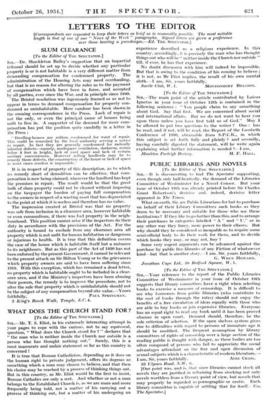WHAT DOES THE CHURCH STAND FOR ?
[To the Editor of THE SPECTATOR.]
SIR,—Mr. T. S. Eliot, in his extremely interesting attempt in your pages to cope with the curious, not to say equivocal, question, " What does the Church stand for ? " declares that the man who is neither inside the Church nor outside is a person who has thought nothing out." Surely, this is a most inaccurate and unfair statement so far as this country is concerned It is true that Roman Catholicism, depending as it does on the human right to private judgement, offers its dogmas as something which a man may choose to believe, and that then his choice may be reached by a process of thinking things out. But in this country, as Mr. Eliot would be the first to insist, Roman Catholics are only a sect. And whether or not a man belongs to the Established Church is, as we are more and more frequently being told, not a matter of his carrying out a process of thinking out, but a matter of his undergoing an experience described as a religious experience. In this country, accordingly, it is precisely the man who has thought things out who will be " neither inside the Church nor outside " till, if ever, he has that experience. No doubt discussion with him will indeed be impossible. But that is owing to the condition of his coming to believe ; it is not, as Mr Eliot implies, the result of his own mental sloth.—I am, Sir, yours faithfully,






















































 Previous page
Previous page